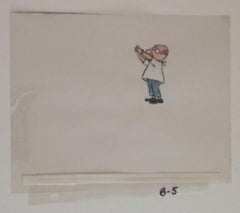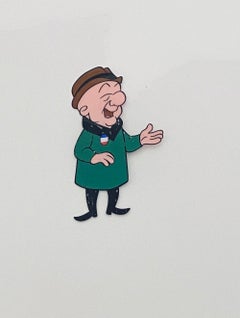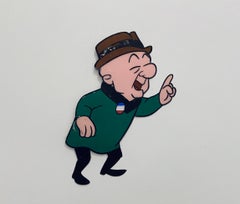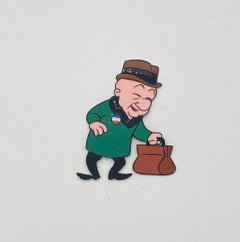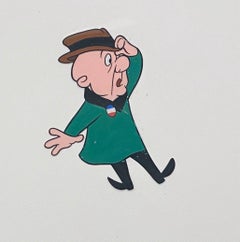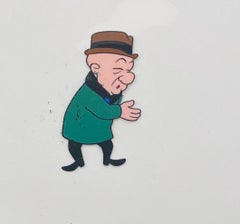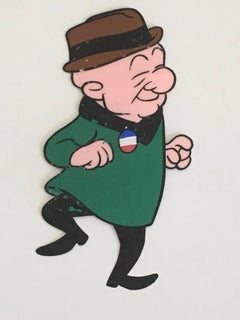Animation Cel
1990s American American Classical Prints
Plastic, Paper
1970s Pop Art Figurative Drawings and Watercolors
Watercolor
Mid-20th Century Pop Art Figurative Drawings and Watercolors
Mixed Media
Mid-20th Century Pop Art Figurative Drawings and Watercolors
Mixed Media
Mid-20th Century Pop Art Figurative Drawings and Watercolors
Mixed Media
Mid-20th Century Pop Art Figurative Drawings and Watercolors
Mixed Media
Mid-20th Century Pop Art Figurative Drawings and Watercolors
Mixed Media
Mid-20th Century American Modern Mixed Media
Mixed Media
Mid-20th Century Pop Art Figurative Drawings and Watercolors
Mixed Media
20th Century American Picture Frames
Canvas
1970s Mixed Media
Other Medium
1990s Pop Art More Art
Paint, Paper, Pencil
1990s Pop Art More Art
Paint, Paper
1980s Pop Art More Art
Paint, Paper, Pencil
20th Century American Paintings and Screens
Glass
20th Century American Paintings and Screens
Glass
1950s Pop Art More Art
Paint, Paper
1990s Pop Art Figurative Prints
Ink, Acrylic
1990s Pop Art Figurative Prints
Ink, Acrylic
1990s Pop Art Figurative Prints
Ink, Acrylic
1990s Pop Art Figurative Prints
Ink, Acrylic
1990s Pop Art Figurative Prints
Ink, Acrylic
1990s Pop Art Figurative Prints
Ink, Acrylic
1990s Pop Art Figurative Prints
Ink, Acrylic
1990s Pop Art Figurative Prints
Ink, Acrylic
1990s Pop Art Figurative Prints
Ink, Acrylic
1990s Pop Art Figurative Prints
Ink, Acrylic
1990s Pop Art Figurative Prints
Ink, Acrylic
1990s Pop Art Figurative Prints
Ink, Acrylic
1990s Pop Art Figurative Prints
Ink, Acrylic
1980s Pop Art More Art
Paint, Paper, Pen, Pencil
1980s Pop Art More Art
Paint, Paper, Pencil
21st Century and Contemporary Modern Abstract Paintings
Canvas, Acrylic
21st Century and Contemporary Modern Abstract Paintings
Canvas, Acrylic
21st Century and Contemporary Modern Landscape Paintings
Canvas, Acrylic
21st Century and Contemporary Modern Figurative Paintings
Canvas, Acrylic
1960s Pop Art More Art
Paint, Paper, Pencil
20th Century Other Art Style Mixed Media
Other Medium
20th Century Other Art Style Mixed Media
Other Medium
20th Century Other Art Style Mixed Media
Digital
1990s Pop Art More Art
Paint, Paper, Pen, Pencil
1990s Pop Art More Art
Paint, Paper, Pencil
1990s Pop Art More Art
Canvas, Paint, Giclée
1990s Pop Art More Art
Paint, Paper, Pencil
1990s Other Art Style Mixed Media
Plastic, Paper, Acrylic, Color Pencil
1990s Other Art Style Mixed Media
Plastic, Paper, Acrylic, Color Pencil
1980s Other Art Style Mixed Media
Plastic, Paper, Acrylic
1980s Other Art Style Mixed Media
Plastic, Paper, Acrylic
1980s Other Art Style Mixed Media
Plastic, Acrylic
1990s Drawings
Acrylic
Late 20th Century Pop Art Figurative Paintings
Other Medium
1990s Pop Art Portrait Prints
Other Medium
1990s Pop Art Portrait Prints
Other Medium
1980s Abstract Impressionist Animal Drawings and Watercolors
Acrylic, Watercolor
Late 20th Century Prints
Plastic
1970s Pop Art Figurative Drawings and Watercolors
Acrylic Polymer, Mylar
1970s Pop Art Figurative Drawings and Watercolors
- 1
Animation Cel For Sale on 1stDibs
How Much is a Animation Cel?
A Close Look at Pop-art Art
Perhaps one of the most influential contemporary art movements, Pop art emerged in the 1950s. In stark contrast to traditional artistic practice, its practitioners drew on imagery from popular culture — comic books, advertising, product packaging and other commercial media — to create original Pop art paintings, prints and sculptures that celebrated ordinary life in the most literal way.
ORIGINS OF POP ART
- Started in Britain in the 1950s, flourished in 1960s-era America
- “This is Tomorrow,” at London's Whitechapel Gallery in 1956, was reportedly the first Pop art exhibition
- A reaction to postwar mass consumerism
- Transitioning away from Abstract Expressionism
- Informed by neo-Dada and artists such as Jasper Johns and Robert Rauschenberg; influenced postmodernism and Photorealism
CHARACTERISTICS OF POP ART
- Bold imagery
- Bright, vivid colors
- Straightforward concepts
- Engagement with popular culture
- Incorporation of everyday objects from advertisements, cartoons, comic books and other popular mass media
POP ARTISTS TO KNOW
- Richard Hamilton
- Andy Warhol
- Marta Minujín
- Claes Oldenburg
- Eduardo Paolozzi
- Rosalyn Drexler
- James Rosenquist
- Peter Blake
- Roy Lichtenstein
ORIGINAL POP ART ON 1STDIBS
The Pop art movement started in the United Kingdom as a reaction, both positive and critical, to the period’s consumerism. Its goal was to put popular culture on the same level as so-called high culture.
Richard Hamilton’s 1956 collage Just what is it that makes today’s homes so different, so appealing? is widely believed to have kickstarted this unconventional new style.
Pop art works are distinguished by their bold imagery, bright colors and seemingly commonplace subject matter. Practitioners sought to challenge the status quo, breaking with the perceived elitism of the previously dominant Abstract Expressionism and making statements about current events. Other key characteristics of Pop art include appropriation of imagery and techniques from popular and commercial culture; use of different media and formats; repetition in imagery and iconography; incorporation of mundane objects from advertisements, cartoons and other popular media; hard edges; and ironic and witty treatment of subject matter.
Although British artists launched the movement, they were soon overshadowed by their American counterparts. Pop art is perhaps most closely identified with American Pop artist Andy Warhol, whose clever appropriation of motifs and images helped to transform the artistic style into a lifestyle. Most of the best-known American artists associated with Pop art started in commercial art (Warhol made whimsical drawings as a hobby during his early years as a commercial illustrator), a background that helped them in merging high and popular culture.
Roy Lichtenstein was another prominent Pop artist that was active in the United States. Much like Warhol, Lichtenstein drew his subjects from print media, particularly comic strips, producing paintings and sculptures characterized by primary colors, bold outlines and halftone dots, elements appropriated from commercial printing. Recontextualizing a lowbrow image by importing it into a fine-art context was a trademark of his style. Neo-Pop artists like Jeff Koons and Takashi Murakami further blurred the line between art and popular culture.
Pop art rose to prominence largely through the work of a handful of men creating works that were unemotional and distanced — in other words, stereotypically masculine. However, there were many important female Pop artists, such as Rosalyn Drexler, whose significant contributions to the movement are recognized today. Best known for her work as a playwright and novelist, Drexler also created paintings and collages embodying Pop art themes and stylistic features.
Read more about the history of Pop art and the style’s famous artists, and browse the collection of original Pop art paintings, prints, photography and other works for sale on 1stDibs.
